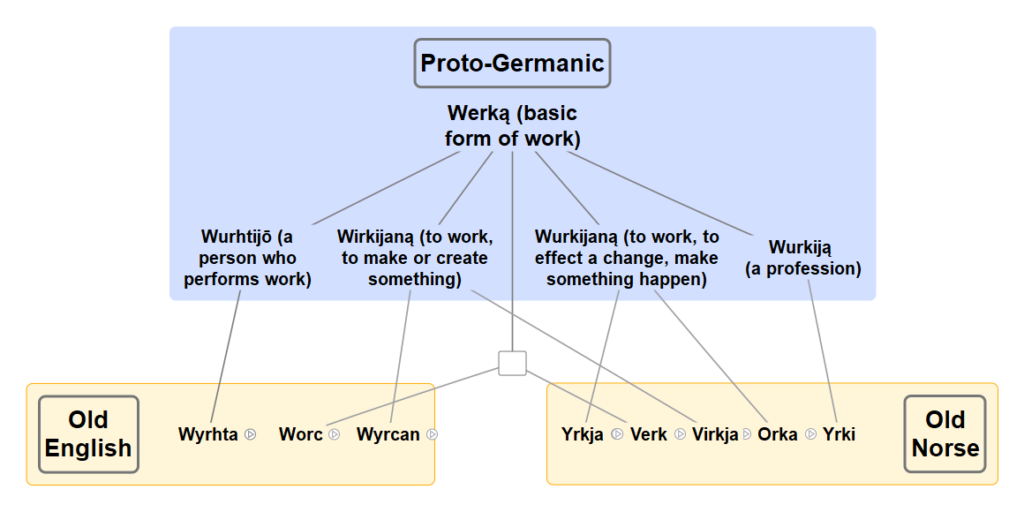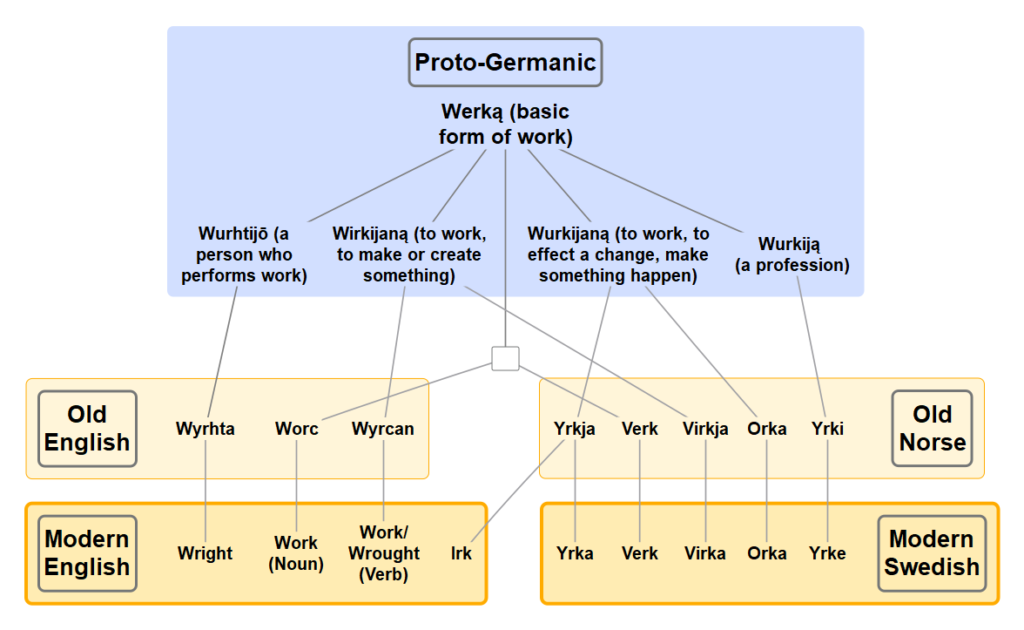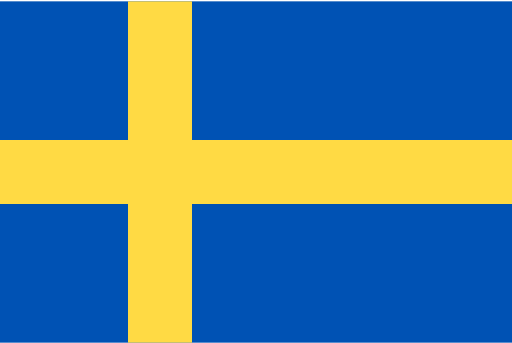Swedish Words for Work – Part 2
This is a continuation of my previous post on how to more accurately translate words for “work” from Swedish to English, and vice versa. In that post I covered a few different cases where we would say “work” in English, but Swedish has several options that are not quite as interchangeable. This is one instance where I find I have to choose my Swedish words carefully (probably something I could improve in English to be honest…) to express what I want to say.
This is my favorite kind of nerdy post, where I dig into the history and etymology of “work” words and explore interesting offshoots. If you’re interested in this kind of thing, you can jump to the end of this article and I’ll outline how I do research for these types of articles.
Proto-Germanic
Proto-Germanic is a reconstructed language created by studying how words and sounds have evolved through the different languages in the Germanic language family. It can be considered the closest common ancestor of Old Norse and Old English. For the purposes of this article I’m going to stick with Proto-Germanic and not step further back in time to Proto-Indo-European to avoid having to write a book on the subject.
There are a few variations of words for “work” in Proto- Germanic, but the most basic form was something like “Werka”. There were variations on this such as “Wirkijaną” (to make, to effect or make something happen), “Wurkijaną” (to work, or make something), “Wurkiją” (profession or occupation), an Keep in mind these words have been reconstructed based on current descendants across various languages. Accordingly, spellings and definitions may be off, but these are our best guesses to make sense of the language family.
Old Norse And English
Language Mixing
The Proto-Germanic roots split off into multiple languages, and there are a more steps in between these and Old English and Old Norse, but for the purposes of learning Swedish I’m focusing on what happened in Old English and Old Norse. This where things really start to get interesting.
There was a time period where a huge amount of vocabulary was being exchanged across both languages, primarily happening in the Danelaw region in northern England. This is a fascinating bit of history to look into, and is one of the reasons why English has so many variations of the same words, even before French (and invasions) arrived and started adding even more vocabulary.
Getting back to the “work” words, the progression looks something like this. We have the basic “Werka” from Proto-Germanic, which seems to have become “Verk” in Old Norse, and “Worc” (or Weorc) in Old English. This carried the connotation of being a physical piece of work such as handiwork, artwork, etc. “Verk” appears unchanged in modern Swedish, with a spelling shift to “Work” in English. The shift from “W” sounds in English to “V” sounds in Scandinavian languages is an incredibly common feature that tends to give away when a pair of words is related.
Work as a Verb
When the concept of work becomes more active, as in “to perform work”, there are slightly different roots that seem to split and re-merge in the modern languages, creating new meaning for related ideas. The Proto-Germanic “Wurkijaną” (to do work) seems to have become “Wyrcan” in Old English, while in Old Norse it split into two words “Yrkja” and “Orka”. These are incredibly similar to their modern counterparts in Swedish, Norwegian, Danish, and Icelandic.
Lastly, “Wurkiją” (a profession or occupation), and “Wurhtijō” (a person who performs a task or work) appear to keep those separate meanings as they evolved. “Wurkiją” became “Yrki” in Old Norse, and “Wurhtijō” changed to “Wyrhta” in Old English. Here is a diagram to help you keep all of that straight:

Here you can see that some words have descendants in both branches, some only have one or the other, and sometimes one would spawn several variations. Often Old English forms died out and were replaced in Modern English, while the Norse version survived into the modern Scandinavian languages.
I would stress again that I am skipping a lot of steps in between languages here. There were plenty of intermediary forms and borrowings into other languages and back again.
Old English and Norse into Swedish
Playwrights and Wrought Iron
I’ve described the relationship between “Work” and “Verk”, but what about a person who performs work? In Old English this was “wyrhta”, which by the time of Middle English becomes more recognizable as “wright”. Some examples include “playwright”, “shipwright”, or “millwright”. Besides these terms or as a last name, this is rare in Modern English, but think of “wright” as “worker”. We do also still use a past tense version of a related word – “wrought”, as in “wrought iron”. This comes from the Old English “Wyrcan”, which evolved into “work” in present tense, and “wrought” in past tense. In Swedish you can say “smidesjärn” for what we call wrought iron. That literally translates to “smithed iron”. You might also recognize it in the phrase “wrought havoc” which really just means “worked havoc”.
Having Energy and making Arguments
The words that gave us “wright” and “wrought” in English became “Orka” and “Yrkja” in Old Norse.
“Orka” is still found unchanged in Swedish, and is a verb meaning “to have the energy to do something”. This is a fantastic words we really don’t have an equivalent for in English. An example is if someone asked you do a task/chore that you are too tired for, you could simply say “Jag orkar inte” (I don’t have the energy for that).
“Yrkja” became “Yrka” in modern Swedish, which means to urge someone to do something, make a demand, or have some kind of requirement. You can also use it in the context of making a legal argument in court, or arguing for a proposal at a meeting. At first this doesn’t seem to have anything to do directly with working, but you could argue that you could “work on someone” using words to get something you want. This interpretation is supported by the fact that “Yrkja” exists in Icelandic meaning a composer or poet.
Many of these words carry a connotation of tiring out or being weary of something, and that comes through in an English descendant of “Yrkja” – “Irk”. In English it has a connotation of annoyance, which we commonly phrase as “being tired of” something. You can describe something that is “irksome” as being “tiresome” as well.
Career or Profession
The last Old Norse word I mentioned is “Yrki”, which shifted slightly into modern Swedish as “Yrke”, which means profession. This was the first Swedish word I learned that meant career, but I found out later there is also “Karriär”, which basically means the same thing. That opens up some interesting questions about what other languages are contributing to this mix. Here is the most complete diagram I have so far on the progression into modern language, which I’ll update as I come across new branches:

Part 3 – Work words from other languages
Now we have 8 words across 2 languages (and really many more). So how did multiple forms of the same word develop? Why does Swedish use so many forms of “work”, but the most common one, “arbete”, doesn’t exist in English? Why does Swedish use “yrke” and “karriär” when English went with “career” and “profession”? I want to answer these lingering questions in the next part of what is now apparently a 3-part series. I’ll also look at how words for “Orphan”, “Chariot”, and “Robot”, are related to the theme of work. Until now I’ve been focusing on Proto-Germanic, Old Norse, and Old English, but in the next part I’ll add some Latin, French, and possibly Polish into the mix to spice things up a little.
Thanks for reading! Here is a bonus section if you’re interested in how I do research for these articles.
Research Process and Language Resources
Etymology Starting Point
I’ll start with keeping notes on clusters of words that seem to share a common theme. Then I’ll check out their entries on Wiktionary, which actually does a great job outlining etymology. Their categories page for Swedish is surprisingly thorough, and works well for a starting point. I’ll cross check these with various Proto-Germanic Etymology dictionaries to make sure I’m looking up the correct historical branch of the particular word, then do a look up on the Swedish Etymology Dictionary at Etymologeek.
Definitions and Context
Since I’m a language learner and not a linguist, I’ll want to make sure I haven’t misunderstood the definition of the Swedish words. I’ll head over to Svenska.se, which lets you search through the official Svenska Acadamien word list and dictionaries. These are entirely in Swedish, but it’s good practice to try to define a word using its native definition. To make sure I understand the proper context I’ll enter in into Exempelmenginar.se, which is phenomenal if a word is used in a few different ways. And lastly, I will run all of this by my exceptionally patient and intelligent girlfriend in the hopes of having gotten at least something right.*
*She may have got hold of the final edit of this post… 🙂
